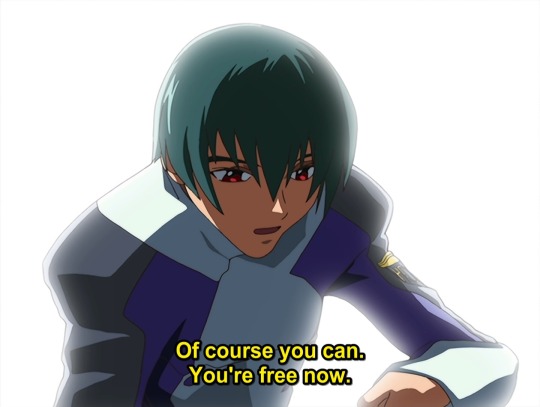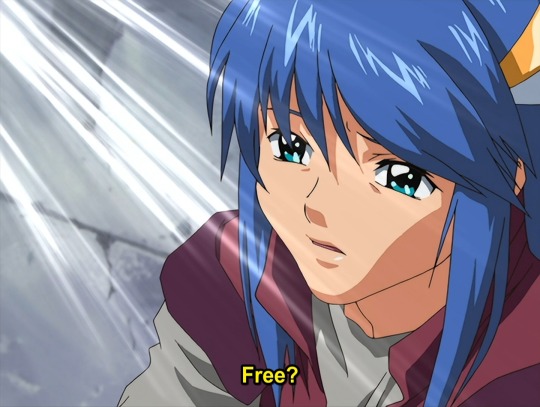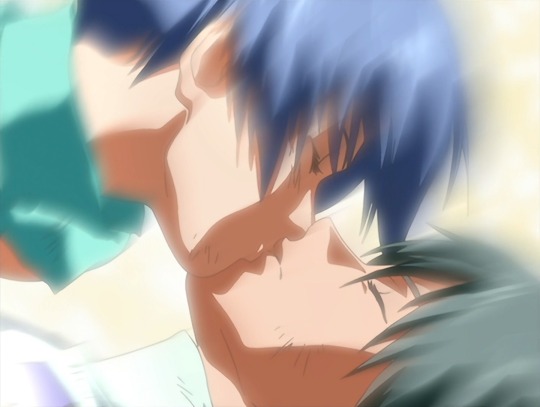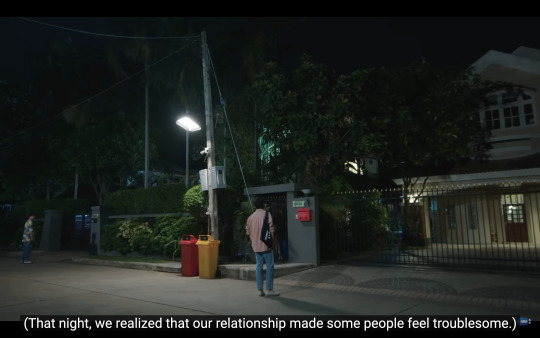#one day I'll rewatch the series and write meta about all the ways it reminds me of SK
Photo



It’s midnight and I’m DEEP into my Scheris/Ryuho feelings. This episode will always, always gut me.
#scryed#scheris adjani#scheris x ryuho#ryuho x scheris#one day I'll rewatch the series and write meta about all the ways it reminds me of SK#in fact I genuinely can't remember which I shipped first#I am so glad that at least scheris and ryuho had a happy ending in the manga#otp: eternal devotion#otps: should've been#straight to my heart#always and forever#no seriously though their meeting is textbook sasukarin#it's INSANE#how similar the entire set-up is#stoic boy saves girl's life and shows her out-of-character kindness#girl is inspired by this kindness and by this boy#having lost everything but having gained this boy she joins the same organisation as him#ends up raising through the ranks and gaining his trust to the point she becomes his partner#and sticks with him through thick and thin trying to help him to achieve his goals because she believes in his cause#and when he's in danger there's nothing that'll stop her from reaching his side#I am w e a k
8 notes
·
View notes
Text
Turtles Catches Up With Old GMMTV: The Bad Buddy Rewatch Edition, Part 1 -- Where BBS Came From, What It References, and More
[What’s going on here? After joining Tumblr and discovering Thai BLs through KinnPorsche in 2022, I began watching GMMTV’s new offerings -- and realized that I had a lot of history to catch up on, to appreciate the more recent works that I was delving into. From tropes to BL frameworks, what we’re watching now hails from somewhere, and I’m learning about Thai BL's history through what I’m calling the Old GMMTV Challenge (OGMMTVC). Starting with recommendations from @absolutebl on their post regarding how GMMTV is correcting for its mistakes with its shows today, I’ve made an expansive list to get me through a condensed history of essential/classic/significant Thai BLs produced by GMMTV and many other BL studios. My watchlist, pasted below, lists what I’ve watched and what’s upcoming, along with the reviews I’ve written so far. Today, I kick off the first of four (or more, whoa!) posts on Bad Buddy. I'll look today at Thai BLs that preceded Bad Buddy that BBS spoke to, the tropes and themes that BBS reshapes and adds to the genre's existence, and I'll also take a look at singular commonalities among Aof Noppharnach's shows.]
Links to the BBS OGMMTVC Meta Series are here: part 1, part 2, part 3a, part 3b, and part 4
Since April of this year, I have been watching drama after drama, BL after BL, to get myself familiar enough with the Thai BL genre in order to understand... at least, much more about Bad Buddy than I previously understood when I first watched BBS in January. Today, I'm going to test my mettle, my newfound exposures to the genre, in taking a look at what made BBS so special by way of what came before it.
(Let me quickly note that in no way, shape, or form do I consider myself an expert in the Thai BL genre. That honor is for the people who've been through the trenches for years, people like my dear friends @bengiyo, @so-much-yet-to-learn, and more.)
As usual with my OGMMTVC analyses, here's a little outline for the lovers:
1 ) Some quick additional thoughts on how BBS reshapes Thai BL tropes, building off of meta from the time of BBS's original airing,
2) How I think earlier shows spoke to BBS by way of influence, as well as shared writing and/or directing teams in some instances, and
3) Similarities in the emotional structures of some of the most important protagonists of major GMMTV BLs, including Third, Sarawat, Phupha, and Pran.
Just as a quick reminder from my preamble post a couple of days ago, one of the inspirations for my creating the Old GMMTV Challenge was from a discussion I had with @miscellar regarding the Thai BL tropes that Bad Buddy referenced and reshaped. This post is what I have permanently linked as a means of partly explaining the context of why I created the OGMMTVC, but I also want to direct your attention to this other post by @miscellar regarding from whence BL tropes often stem from -- namely, conventions of reference from the het romance genre.
I want to posit two points to get this started. I think that, fundamentally, the general fandom loves what BBS did by way of both including and reshaping Thai BL tropes. Tropes do indeed give structure to many Thai BLs very often, as @miscellar notes in their second linked post. Even director Aof Noppharnach and the cast of Bad Buddy note this point as a central structural foundation to their show.
I would also posit that us as a fandom (or, at least, just speaking for myself)... happen to love many (but not all) of the tropes themselves, or at least to some extent, particularly by way of nostalgic reference. When I was really getting underway with the OGMMTVC watchlist earlier this spring, I could see in watching, say, Love Sick or SOTUS, the birth of the tropes. Phun and Noh hosing each other down, Kongpob and Arthit not only being engineers in SOTUS, but seeking out careers in the field in SOTUS S. The hubby/wifey language, the strong seme/uke energy in Make It Right, in Together With Me, and so on.
I felt that the Thai BL trope framework, in the course of my watchlist progress, first truly coalesced as a means of a coded and referential artistic infrastructure in Love By Chance. Love By Chance, based on a novel by MAME and written and directed by the longtime BL creator, New Siwaj, had it all. Engineering students in a university setting, rich boy/poor boy, seme/uke/top/bottom dynamics, queer revelations, beach trips, the guitars and the singing, all of it. Back in June, I called LBC the first derivative structured BL -- clearly a BL that came from those that preceded it.
To @miscellar's points in their second linked post: LBC also had, I feel, quite a lot of problematic elements. Before I watched TharnType, I was already calling out a discomfort I felt about homophobia within MAME's material in LBC. I also noted very strong macro cishet romance elements in the way Ae approached his engagements with Pete, romantic and intimate.
We know now that Bad Buddy just grabbed these tropes, and even some of these problematic elements, like the demand for a clearly binary seme/uke dynamic -- and turned them on their heads. Pat and Pran were equals and partners, full-stop. No seme/uke, no top/bottom, no gay for you, no wifey this and hubby that. Bad Buddy took SOTUS and LBC by their shoulders and said -- not today, not on my watch (and BBS AND A Tale of Thousand Stars did it AGAIN in Our Skyy 2!). Especially in closing out Bad Buddy through Our Skyy 2, I love how very specific Pat and Pran were about their verse relationship, with both guys, throughout the series and in OS2, asking each other for each other's ratings of their nightly performances. Yes, it was hilarious and cute and flirty, but those conversations were also very pointed -- and they very much harkened way, way back to themes that Aof and his colleague, Jojo Tichakorn, had explored as screenwriter and director of Gay OK Bangkok (here and here), and in Jojo's The Warp Effect, all of these shows preceding their work in BLs.
I think the turning-on-the-heads of these tropes, within an otherwise classic Thai BL, created an utterly unique fabric by which a new kind of nostalgia for the particular show that is Bad Buddy could be created -- something that almost cannot be RECREATED by the way of the construction of the universe of equality, love, mutual respect, and miraculous communication that Pat and Pran had established between each other. The equitable dynamic in Bad Buddy between Pat and Pran, of the honesty and incredibly open empathic communication that these two had between each other, seems to me to be truly unique -- ESPECIALLY in the face of the massively biased and dysfunctional communicative styles of their parents.
Moreover, now that I'm at this point of the OGMMTVC list -- AND including what I know about his shows post-Bad Buddy, in Moonlight Chicken, Our Skyy 2, and Last Twilight, which is airing now -- we now know that Aof has created HIS OWN SET OF TROPES THROUGH HIS SHOWS. He is the queer filmmaker in Thai BLs par excellence to create a conversation among his shows, and shows made by his colleagues, that speak to each other by way of symbolism, and, I believe, a harkening back both to previous expectations of older queer media AND to older Asian media, particularly by way of either open-ended and/or melancholic endings, as well as general explorations of melancholy and bittersweetness in his shows on behalf of queer characters.
(Before I give some specific examples of Aof's own trope structures by way of inspiration and influence, I do want to note that the aforementioned New Siwaj does this, too, particularly by way of his making references to The Love of Siam in his shows. Love of Siam is known for having a relatively tragic ending between two young queer men. The movie itself is shown and referenced in New's Absolute Zero and My Only 12% -- and the actors who play Tong's parents, who interfere in Tong's relationship with Mew, are reunited as parents in New's Until We Meet Again, where they support Dean's relationship with Pharm. However, I tend to focus on Aof in admiration as his art is generally more consistently excellent.)
So! What are the new tropes that Aof references in his shows -- the new trope frameworks that he's created for himself, to reflect his own interpretation of the Thai BL genre? We have upside-down smiley faces in Bad Buddy -- but we saw them first in Still 2gether! We have picture boards all over the place in Aof's cinematic universes -- in ATOTS, in BBS (TWICE!) (in two different apartments!), in Moonlight Chicken between Alan and Wen. We have scenes of temples, of culturally-rooted spirituality, from He's Coming To Me, to Moonlight Chicken, and now in Last Twilight. From Phupha's internalized homophobia in A Tale of Thousand Stars, to Jim's internalized homophobia in Moonlight Chicken, Aof doesn't shy away from examining the impacts of the pasts of traditional childhoods in rural settings. Call me a cheesy mom, but I happen to love Aof's tendency to punctuate light moments with cute sound effects.
But beyond tropes and trope frameworks, I think the ways in which Bad Buddy speaks to prior shows -- and vice versa, the way that prior shows ended up contributing to Bad Buddy -- were far more impactful by way of larger, macro-level themes.
While we see on BBS the impact of shows like SOTUS (in SO MANY PLACES in BBS besides Pa's gay-for-you reference and the husband/wife reference, including here and here), I Told Sunset About You, and I Promised You The Moon (I'll have more on IPYTM in a post next week about pain, trust, and separation), we also see what themes the future Bad Buddy team was trying out in their own previous shows. Besides Aof's Still 2gether and A Tale of Thousand Stars, the writing team of Au Kornprom, Bee Pongsate, and Pratchaya Thavornthummarut worked on Theory of Love together. Besides becoming a HUGE fave of mine through the OGMMTVC project, I think Theory of Love held possibly some of the most important proto-BBS themes that I saw along the cinematic way to get to Bad Buddy.
Theory of Love, generally speaking, is about how one person can try to change for another person -- and how that other person, and/or the world, accepts that change.
To fast-forward to the end of BBS: we know that the boys take inspiration from Uncle Tong that they will not let the world of their own intergenerational traumas from their families keep them from loving each other, and being in a devoted relationship with each other. Their empathy for their parents dictates that they'll spare their families the pain of being open about their relationship, and they'll keep the somewhat transparent secret that they're together from being discussed in the open.
Pat and Pran negotiate the impacts of how their relationship may change the people around them -- and they make an empathic decision to spare the families the pain of the upfront realization of that truth. Remember what they say in episode 12:

While Bad Buddy focuses on how the team of Pran and Pat negotiate how their relationship will change others -- I see in Theory of Love the testing of this theme within the potential romantic relationship of Khai and Third. I see Au, Bee, and Pratchaya playing with an idea of change and saying, hey, this is how it can work, and this is how it may not work, realistically. I think Khai and Third end up being a successful couple because -- unlike Pran and Pat -- they don't have to negotiate a generational divide to allow change to infiltrate their lives. (In fact, Third's own process of change, and his acceptance of Khai's change, reflects Pran's journey to welcome Pat into his heart, and Wai's journey to accept Pat's and Pran's relationship.) I love how we see this getting played with, literally by the Bad Buddy squad themselves, in Theory of Love.
It was @lurkingshan who first noted the similarities between Third and Pran for me, and I want to expand on that conversation for a moment to talk about another importance fencepost in Aof's thematic universes -- what our dear friend @bengiyo calls The Knowing of queer male characters in BL dramas.
Third is not Aof's character -- Third belongs to X Nuttapong as the director of Theory of Love -- but Pran, Sarawat from 2gether/Still 2gether, and Phupha of A Tale of Thousand Stars all belong to Aof, and Third was written by Aof's usual squad of writer homies. Third, Sarawat, Phupha, and Pran are all characters written with The Knowing of their being queer in their bones and existences, dealing with a certain amount of suffering and realistic realizations related directly to that Knowing -- in large part, carrying with them painful assumptions of unrequited love, and/or the inability to live openly in love with those that they pine for, until a happy or somewhat-happy ending meets them at the end of their dramatic journeys.
I've unwound quite a bit in my past writing (namely regarding The Love of Siam and the endings of Gay OK Bangkok) of how it moves me incredibly deeply that Aof doesn't shy away from pain, reflections of pain, and either painful and/or open-ended endings in his works. With Third, Sarawat, Phupha, and Pran, us viewers were treated to detailed and empathic journeys of realization and change as these characters negotiated their own paths to intimate honesty with their eventual partners. But those paths were DAMN hard. Many of us still can't shake Pran walking away in crushed tears at the end of episode 5. I'm forever moved by Sarawat's meditation to Earn about the meaning of his relationship and of his love for Tine in Still 2gether as he and Tine are temporarily separated before their school competition.
As an out, queer man, Aof treats his Knowing characters with the greatest empathy. Not all of them, interestingly, are great communicators. In my humble opinion, Third treads chump territory many times throughout Theory of Love. Phupha's, like, one of the worst communicators ever, and this was absolutely solidified until the very end of Our Skyy 2 x ATOTS. We had to have Pran compete with Pat throughout all of episode 6 of Bad Buddy for them to finally confirm their relationship as boyfriends -- and a huge part of that was about Pat revealing to Pran that Pat's competitions with Pran are really more about getting closer and more intimate. The incredible @telomeke (via their side blog, @telomeke-bbs) has written about Pran's outside façade vs. his inner sanctuary, and how so very often in his external life, Pran feels compelled to be visually far more organized than he feels internally. The stress and pressure of that will naturally cause some amount of dissociation, emotional confusion, and distance of the kind we saw at the end of episode 5.
I'm going to unwind more about this in an upcoming Big Meta on pain, trust, and separation in many of Aof's shows, but I want to highlight these melancholic themes and infrastructures here now, because I really think they lend emotional depth and connections to shows either led by Aof and/or his close colleagues. These are tough themes to think about. The endings can absolutely be interpreted as happy endings in most cases -- even though an Asian viewer like myself, very much raised on Asian content, can read between the lines of these endings to understand their melancholic underpinnings.
Bad Buddy is perhaps the most popular of Aof's dramas, I'd posit, because while the ending of the series is a little sad to contemplate -- it ends, as it began, with utter equality between Pat and Pran as protagonists who deeply care about each other, to the point of establishing what I might term as a radical re-envisioning of the broken and traumatic paradigm that their parents forced upon each of them as children. By engaging, essentially, in radical empathy to each other, they triumphed over the global framework of what was set before them by their own private familial society.
I think this emphasizes the tremendous largesse of the personal changes that Aof's characters undergo in their emotional processes -- whether these characters are Knowing characters, or if, like Pat, they've experienced queer revelations within their shows. To hand to these characters these TREMENDOUS emotional journeys, and to situate these journeys in shows that treat these characters with the utmost respect, lends to Aof's shows -- especially Bad Buddy -- a safety net for us as viewers to trust fully in the journeys we're watching.
Aof takes tropes and problematic themes and reorganizes them, like a Rubix cube. He takes themes that Asians and queer family know of far too well, like intergenerational trauma or social outcasting, and shows how his characters can still find happiness, while realistically keeping these traumas within a character's horizon. And, he's created his own trustworthy frameworks of art that we can depend on as fans. I love and appreciate the patterns in this, and I continue to remain in awe at the power that Bad Buddy had in encapsulating so much of what was percolating in Aof's mind and fingertips as he constructed this show with the influence of others -- making this show a truly legendary one.
(Tagging @dribs-and-drabbles and @solitaryandwandering by request! If you'd like to be tagged, please let me know!)
[First BBS OGMMTVC meta down, and more to come! Stay tuned next week for a Big Meta on Pain, Trust, and Separation in Some Asian Dramas. The piece will hew close to Bad Buddy, but I've got some other GMMTV and non-GMMTV dramas (and even a Japanese dorama BL) in there to analyze as well.
Here's the complete OGMMTVC watchlist as it stands today. Tumblr's web editor is utterly jacking with this list; for a more accurate look at what I've watched, please mosey over to this link!
1) The Love of Siam (2007) (movie) (review here)
2) My Bromance (2014) (movie) (review here)
3) Love Sick and Love Sick 2 (2014 and 2015) (review here)
4) Gay OK Bangkok Season 1 (2016) (a non-BL queer series directed by Jojo Tichakorn and written by Aof Noppharnach) (review here)
5) Make It Right (2016) (review here)
6) SOTUS (2016-2017) (review here)
7) Gay OK Bangkok Season 2 (2017) (a non-BL queer series directed by Jojo Tichakorn and written by Aof Noppharnach) (review here)
8) Make It Right 2 (2017) (review here)
9) Together With Me (2017) (review here)
10) SOTUS S/Our Skyy x SOTUS (2017-2018) (review here)
11) Love By Chance (2018) (review here)
12) Kiss Me Again: PeteKao cuts (2018) (no review)
13) He’s Coming To Me (2019) (review here)
14) Dark Blue Kiss (2019) and Our Skyy x Kiss Me Again (2018) (review here)
15) TharnType (2019-2020) (review here)
16) Senior Secret Love: Puppy Honey (OffGun BL cuts) (2016 and 2017) (no review)
17) Theory of Love (2019) (review here)
18) 3 Will Be Free (2019) (a non-BL and an important harbinger of things to come in 2019 and beyond re: Jojo Tichakorn pushing queer content in non-BLs) (review here)
19) Dew the Movie (2019) (review here)
20) Until We Meet Again (2019-2020) (review here) (and notes on my UWMA rewatch here)
21) 2gether (2020) and Still 2gether (2020) (review here)
22) I Told Sunset About You (2020) (review here)
23) YYY (2020, out of chronological order) (review here)
24) Manner of Death (2020-2021) (not a true BL, but a MaxTul queer/gay romance set within a genre-based show that likely influenced Not Me and KinnPorsche) (review here)
25) A Tale of Thousand Stars (2021) (review here)
26) A Tale of Thousand Stars (2021) OGMMTVC Fastest Rewatch Known To Humankind For The Sake Of Rewatching Our Skyy 2 x BBS x ATOTS (re-review here)
27) Lovely Writer (2021) (review here)
28) Last Twilight in Phuket (2021) (the mini-special before IPYTM) (review here)
29) I Promised You the Moon (2021) (review here)
30) Not Me (2021-2022) (review here)
31) Bad Buddy (2021-2022) (thesis here)
32) 55:15 Never Too Late (2021-2022) (not a BL, but a GMMTV drama that features a macro BL storyline about shipper culture and the BL industry) (review here)
33) Bad Buddy (2021-2022) and Our Skyy 2 x BBS x ATOTS (2023) OGMMTVC Rewatch (The BBS OGMMTVC Meta Series is ongoing: preamble here, more reviews to come)
34) Secret Crush On You (2022) [watching for Cheewin’s trajectory of studying queer joy from Make It Right (high school), to SCOY (college), to Bed Friend (working adults)] (watching)
35) KinnPorsche (2022) (tag here)
36) KinnPorsche (2022) OGMMTVC Fastest Rewatch Known To Humankind For the Sake of Re-Analyzing the KP Cultural Zeitgeist
37) The Eclipse (2022) (tag here)
38) The Eclipse OGMMTVC Rewatch For the Sake of Re-Analyzing an Politics-Focused Show After Not Me
39) GAP (2022-2023) (Thailand’s first GL)
40) My School President (2022-2023) and Our Skyy 2 x My School President (2023)
41) Moonlight Chicken (2023) (tag here)
42) Bed Friend (2023) (tag here) (Cheewin’s latest show, depicting a queer joy journey among working adults)
43) Be My Favorite (2023) (tag here) (I’m including this for BMF’s sophisticated commentary on Krist’s career past as a BL icon)
44) Wedding Plan (2023)
45) Only Friends (2023) (tag here)]
#bad buddy#bad buddy meta#bad buddy the series#bad buddy the series meta#backaof noppharnach#theory of love#still 2gether#a tale of thousand stars#our skyy 2 x bad buddy#our skyy 2 x bad buddy x a tale of thousand stars#nanon korapat#ohm pawat#patpran#pat x pran#pran x pat#turtles catches up with old gmmtv#turtles catches up with thai BLs#turtles catches up with the essential BLs#the old gmmtv challenge#ogmmtvc#the bbs ogmmtvc meta series
50 notes
·
View notes